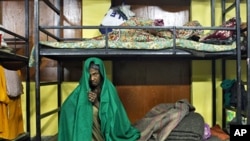In India, fears are growing that runaway inflation could slowdown the brisk growth of its economy, which was among the fastest to recover from the global financial crisis. In particular, a huge rise in food prices has emerged as a major worry for a country with millions of poor people.
Forty-year-old Shamlesh Devi has prepared a simple lunch of Indian bread called "rotis" and a chutney (sauce) of coriander leaves for her five children.
She says high prices of onions and potatoes are a huge burden on her family. She says poor people cannot even afford these basics.
Shamlesh lives in the Indian capital, in a slum colony where earnings of most families are about $ 150 to $ 200 a month.
She and her neighbors are fuming because high food prices have forced them to cut portions of food and have impacted their ability to put money into savings.
Food inflation has been running more than 10 percent, in the past year. But it made headlines when it crossed 18 percent in December, after prices of Indian favorites such as onions, tomatoes and garlic spiked. More money has to be forked out for milk, meat and lentils.
Food prices have been rising across much of Asia, but India is battling the highest inflation rate in any major Asian country.
Finance Minister Pranab Mukherjee says the government confronts a problem.
"I am worried over the food inflation,” Mukherjee said. “It cannot be accepted that food inflation would be at the high level."
The high prices of food have become a top issue in a country where nearly half the one point two billion people are poor and spend a large chunk of their meager earnings on food.
Inflation has emerged as a challenge for policymakers, at a time when optimism was running high at the economy’s quick return to nearly nine percent growth following the global economic downturn. That optimism is getting tempered as worries grow that inflation has become entrenched.
Economist Ila Patnaik, at the National Institute of Public Finance and Policy in New Delhi, describes inflation as a very serious threat.
"We have had inflation for two years now and it has not gone away,” said Patnaik. “Policymakers have more or less hoped that it will go away on its own…..You know more of wishful thinking that because its food so when we have better rain it will go away, and then the next time around the rain was too much, so next time if we get a bit less rain, it will go away. But I am very, very concerned that this is something that is there to stay with us.”
Productivity in the farm sector has been stagnant in recent years, whereas a booming economy has put more money in people’s pockets and created millions of more middle class consumers for milk, vegetables and meat. The problem has been aggravated by the distribution system, which involves a chain of middlemen handling food between the farmer and the consumer. The farmer gets a low price leaving him with little incentive or money to plough back into his fields, but the consumer pays a high price.
Finance Minister Mukherjee says the problem in food distribution needs to be addressed.
"We shall have to control inflation, strong signal should be given, supply management is to be tackled, supply bottlenecks are to be removed…," Mukherjee added.
Economists say high food prices are not the only worry. The rising cost of fuel and other raw material could also impact industry. India’s manufacturing sector has slowed down and foreign investment in the country last year declined, despite its booming economy.
Economist Ila Patnaik says high inflation could reduce India’s allure for foreign investors.
"You cannot offer investors a good business environment when you cannot tell them what their cost of production is going to be the next year or the following year and whether they will make profits or not," Patnaik said.
The Central Bank of India has called inflation a dominant concern and hiked interest rates seven times in the past year, in an effort to stem spiraling prices. The government has eased import duties on some food items, amid growing worries that high prices are impacting its popularity. But economists say that these measures may have little impact in the coming months and warn that the economy may slow down.
High Inflation Seen as Threat to India’s Booming Economy
